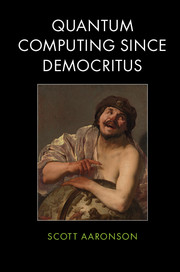Book contents
- Frontmatter
- Dedication
- Contents
- Preface
- Acknowledgments
- 1 Atoms and the void
- 2 Sets
- 3 Gödel, Turing, and friends
- 4 Minds and machines
- 5 Paleocomplexity
- 6 P, NP, and friends
- 7 Randomness
- 8 Crypto
- 9 Quantum
- 10 Quantum computing
- 11 Penrose
- 12 Decoherence and hidden variables
- 13 Proofs
- 14 How big are quantum states?
- 15 Skepticism of quantum computing
- 16 Learning
- 17 Interactive proofs, circuit lower bounds, and more
- 18 Fun with the Anthropic Principle1
- 19 Free will
- 20 Time travel
- 21 Cosmology and complexity
- 22 Ask me anything
- Index
2 - Sets
Published online by Cambridge University Press: 05 April 2013
- Frontmatter
- Dedication
- Contents
- Preface
- Acknowledgments
- 1 Atoms and the void
- 2 Sets
- 3 Gödel, Turing, and friends
- 4 Minds and machines
- 5 Paleocomplexity
- 6 P, NP, and friends
- 7 Randomness
- 8 Crypto
- 9 Quantum
- 10 Quantum computing
- 11 Penrose
- 12 Decoherence and hidden variables
- 13 Proofs
- 14 How big are quantum states?
- 15 Skepticism of quantum computing
- 16 Learning
- 17 Interactive proofs, circuit lower bounds, and more
- 18 Fun with the Anthropic Principle1
- 19 Free will
- 20 Time travel
- 21 Cosmology and complexity
- 22 Ask me anything
- Index
Summary
Here, we're gonna talk about sets. What will these sets contain? Other sets! Like a bunch of cardboard boxes that you open only to find more cardboard boxes, and so on all the way down.
You might ask “how is this relevant to a book on quantum computing?”
Well, hopefully we’ll see a few answers later. For now, suffice it to say that math is the foundation of all human thought, and set theory – countable, uncountable, etc. – that’s the foundation of math. So regardless of what a book is about, it seems like a fine place to start.
I probably should tell you explicitly that I’m compressing a whole math course into this chapter. On the one hand, that means I don’t really expect you to understand everything. On the other hand, to the extent you do understand – hey! You got a whole math course in one chapter! You’re welcome.
So let’s start with the empty set and see how far we get.
THE EMPTY SET.
Any questions so far?
Actually, before we talk about sets, we need a language for talking about sets. The language that Frege, Russell, and others developed is called first-order logic. It includes Boolean connectives (and, or, not), the equals sign, parentheses, variables, predicates, quantifiers (“there exists” and “for all”) – and that’s about it. I’m told that the physicists have trouble with these. Hey, I’m just ribbin’ ya. If you haven’t seen this way of thinking before, then you haven’t seen it. But maybe, for the benefit of the physicists, let’s go over the basic rules of logic.
Information
- Type
- Chapter
- Information
- Quantum Computing since Democritus , pp. 8 - 17Publisher: Cambridge University PressPrint publication year: 2013
